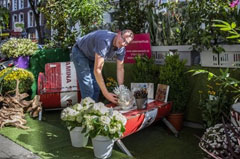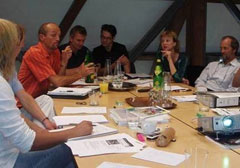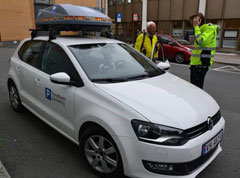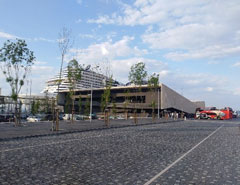 |
||||||||
|
||||||||
 |
 |
 |
 |
 |
 |
 |
||


Dear reader, This e-update is all about parking. Today, parking policy is recognised to be one of the keys to manage urban mobility. Good parking management can help to free up valuable public space, make our cities more attractive, support the local economy, reduce vehicle traffic and congestion, improve road safety, and combat air pollution and greenhouse gas emissions. Moreover, parking management generates revenue to invest in sustainable mobility and urban and social improvements. We invite you to get a taste and learn from current good practise, including insights from the ongoing CIVITAS Park4SUMP project and its predecessor PUSH & PULL. In both projects Mobility Management is an important angle, where EPOMM plays a bridging role. | |
Parking and SUMP: A perfect match |
|
Park4SUMP is an EU-funded Horizon 2020 project under the CIVITAS umbrella. It is dedicated to support cities in the adaptation of parking management policies and to deploy effective and innovative solutions as part of their Sustainable Urban Mobility Plans (SUMPs). In a joint cooperation with its predecessor project PUSH & PULL, a practitioner brief on Parking and SUMP integration has become a part of the new SUMP guidelines. Park4SUMP aims to develop, increase and speed up innovative parking solutions to become part of cities’ SUMP or linked planning processes. The general concept is to learn and profit from the very best parking management strategies in Europe, covering how to:
| |
Where did we go wrong? |
|
In every city, as vehicle traffic increases, so does the demand for parking. A car is parked on average 23 hours a day (Schoup, 2005), occupying up to 95 percent of urban public space. And, although parking regulations, time restrictions and paid parking have been introduced successfully, many cities still struggle with the political and public controversies around parking. Parking is a highly emotive subject. This has led to a typically reactive and operational way of dealing with parking, mainly only responding when a specific problem occurs. An isolated approach can regrettably further facilitate car use. The PUSH & PULL project detailed and documented 16 good reasons for parking management. These evidence- and fact-based information sheets are to be updated by Park4SUMP in spring 2020, provide the necessary information and convincing arguments for practitioners to consider implementing parking management in cities. These arguments are all based on the central tenet that ‘parking management is key to managing urban mobility’. For further helpful arguments and information please visit the Park4SUMP toolbox. | |
Two game changer opportunities |
|
First of all, a new strategic and holistic dimension to parking fits best in the SUMP planning debate. It should be clear that sustainable parking policy transcends the classical parking paradigm that cities most of time were facing. Also Prof. G. Mingardo from Rotterdam University pleads a multiple goal approach, hereby taking into account more behavioural determinants and not just focussing on infrastructure or single use objectives. And secondly, there is no other domain where cities can make this much difference in their SUMPs, as by earmarking revenues from paid parking to finance other sustainable mobility solutions. It could become a strategic starting point in the sustainable urban mobility planning that the revenue earned from parking management should be used for the implementation and promotion of sustainable transport measures. If implemented, there is an ongoing revenue stream, avoiding the need for a separate fixed annual budget. The Belgian City of Ghent, for example, already applied these earmarking principles with success in the PUSH & PULL project, and many Park4SUMP cities follow the concept. | |
Parking management improvement in practise |
|
The 16 Park4SUMP partner cities improve their parking policies and pilot the implementation of parking management good practice solutions in seven fields:
Short video clips available on the Park4SUMP website showcase how the involved cities like Krakow, Rotterdam, Sint-Niklaas, Sofia, Trondheim and Vitoria Gasteiz have implemented actions in these various fields in order to support sustainable development of the transport system. | |
Is it a fundamental right to park your car for free on the street close to your house? |
|
A recent article by De Correspondent sheds light on parking and how it influences our society. The opening statement “Parking has an influence on everything, even for people who don’t even own a car” sets the tone. And the article continues with some mind-boggling figures:
Getting rid of this discrepancy is one the main arguments made in the article to move forward. Those wo really need their car on daily basis will find a place; those who only sporadically use it will reconsider. Local governments have shown their willingness to pay for developing new residential parking facilities. An interesting initiative in this respect is the Vrijstraat initiative in The Hague. The Guardian published an article on their mission to get some cars off the street. | |
Brussels Region announces a 25 percent reduction in on street parking |
|
Ranking high in the most congested European cities, nothing describes the current state better than the car-clogged Brussels street Rue de la Loi, an urban highway pushing active modes onto a cramped sidewalk. Road safety and urban air quality were main topics in the Brussels regional election rally of spring 2019. The Brussels ballot expressed the desire to turn around the omnipresence of cars. The newly installed minister of Mobility and Public Works, Elke Van Den Brandt, proposed an ambitious reduction of parking places in the region. A total of 65,000 on street parking spaces will be scrapped by 2030, bringing the total number under 200,000. ”Our aim is to move the on-street parking spaces, so that more space is created for pedestrians and cyclists, and the city can become more pleasant and liveable”, Van Den Brandt said. At the same time 20,000 new parking spaces will be created for residents in existing parking facilities, through the overnight use of parking spaces that are used during the working day by companies and schools. In the new regional SUMP ‘Good Move’, the reduction of the parking spaces is explained. Integration of the parking strategy in the SUMP, the spearhead measure of Park4SUMP, is taken care of. Things are changing in the notorious car capital of Europe. In the city centre, an enormous construction site is transforming a former four-lane road into a pedestrian zone stretching over 1 km and extending into the existing pedestrian streets. With construction finishing in January 2020 this will be one of the biggest pedestrian zones in Europe. Another interesting off-street parking scheme was introduced in Brussels. Office buildings should apply for an environmental permit for their onsite parking spaces. For the non-sanctioned parking places the company is obliged to pay an environmental charge if they cannot repurpose these places or make them also available for use by residents. This tax, feeding into a climate fund, is increased 10 percent every year. | |
The ParkPAD audit tool |
|
A real game changer in urban parking management will be the development of a new tool called ParkPAD. It provides an audit process that helps cities to review their parking policies and the organisational set-up for them, and to achieve consensus on these improvements by developing an action plan for parking management as part of their SUMPs. Park4SUMP is currently in the process of training independent ParkPAD expert auditors and testing the audits in all participating Park4SUMP cities, thereby undertaking a number of local meetings to work towards building consensus on the state of play in city’s parking policy and practices. These will result in a Parking Policy Quality Report, a ParkPAD Action Plan supporting the city’s SUMP, including an innovative, effective and locally acceptable package of parking management measure. | |
Park4SUMP trainings |
|
Starting in spring 2020, tailor made Park4SUMP training programmes for local, regional and national authorities will be organised in many countries, some of them in cooperation with EPOMM members. The trainings will be targeted to address local parking management needs and focus on the innovative approach of one or more of the above mentioned clusters. Work with us to encourage high level government decision makers to allow and support innovative and effective parking management solutions in cities! For further information, please contact the Park4SUMP coordinator at Mobiel 21. | |
Examples of parking management and SUMPs in EPOMM Member States |
|
In France, parking management is addressed by local policies and planning documents. Within the ‘plans locaux d’urbanisme’ (French designation for SUMPs), parking is tackled from several angles:
Parking management is also increasingly used to achieve sustainable mobility objectives. Examples include a reduction in parking space requirements for developers providing car-sharing services or charging stations for electric vehicles, the provision of bicycle parking spaces in new buildings where car parking spaces are provided, or the limitation of the number of shopping centre parking spaces. Parking is one of the most controversial transport policy issues in many German cities. Rising numbers of cars mean that public space is becoming scarce, whilst very old legal minimum standards have to be met. Commercial and delivery traffic is worsening the problem. The climate protection targets, air pollution control efforts and the improvement of urban quality of life create a need for action. Reduction and management of parking space are central instruments in this context. A new guideline (available only in German) provides arguments for municipalities on how to deal with some of these challenging topics of parking management in Germany. In Freiburg, a Park4SUMP partner, the parking standard in the new housing development area of Dietenbach was reduced to 0.8 based on household research on car ownership. One of the seven lead cities that directly participates in the Interreg MED project LOCATIONS, is the City of Lisbon through the collaborative work established between the Lisbon City Council and Lisboa E-Nova – Energy and environment agency of Lisbon. The project aims to support cruise destination cities to mitigate the negative impact of cruise tourism, finding innovative sustainable transport solutions that will help decrease traffic congestion and greenhouse gas emissions. For each participating city (Lisbon, Malaga, Ravenna, Trieste, Rijeka, Zadar and Durres), a Low Carbon Transport Plan was developed. In Lisbon, a system of short-stay parking spaces (drop off and pick-up only) will be established in conjunction with a long-stay site. The short-stay parking areas will be close enough to attractions so that passengers with low mobility can reach them easily. The time allowed for drop off/pick-up should be enough for these operations to conclude smoothly and for rotation to be promoted (e.g. 5 minutes). After dropping off passengers, buses will park at the long-stay areas which should serve strategic touristic areas and several short-stay parking spaces, and afterwards return to pick-up passengers at the end of their visit. The time allowed to remain in these areas should be adjusted to their capacity and to the number of short-stay spaces they serve (e.g. up to 2 hours). | |
Park4SUMP |
|
This project has received funding from the European Union’s Horizon 2020 research and innovation programme under grant agreement No 769072 The sole responsibility for the content of this e-update lies with the authors. It does not necessarily reflect the opinion of the European Union. Neither the INEA nor the European Commission are responsible for any use that may be made of the information contained therein. Coordinator: | |
Upcoming events in 2020 |
|
| |

 |
 |
 |
 |
 |
 |
 |















